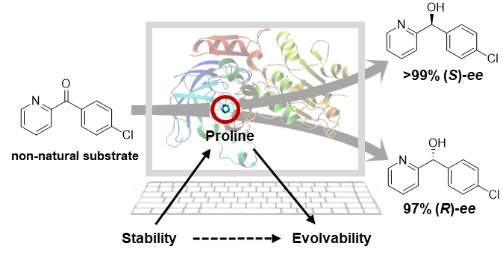Natural enzymes have progressively evolved to fit particular catalytic reactions during evolutionary trajectories, while plentiful protein engineering studies have shown that enzymes can be evolved with novel functions. In some cases, the underlying evolvability was unlocked via altering stability by specific amino acid substitutions. However, identifying the particular mutational positions in a protein to tailor its stability on a tolerable scale that trigger conformational plasticity, and thereupon novel functions, is a fundamental challenge. For this purpose, the SUN Zhoutong group from Tianjin Institute of Industrial Biology, Chinese Academy of Sciences, has developed the Proline Induced Loop Engineering Test (PiLoT) method. It enables protein engineers to discover additional hotspots beyond the conventional ones around the active site. Designed mutagenesis thereat is most likely to generate variants capable of inducing conformational dynamics. As an illustration, the thermophilic alcohol dehydrogenase TbSADH was employed as the biocatalyst in the stereoselective transformation of the difficult to reduce diaryl ketone, which is of pharmaceutical significance. The proline residue (P84) situated at the interface of a β-strand and loop region was mutated, the resultant mutants leading to unusually high (S)- and (R)-selectivity, respectively, amounting to 99% ee and high conversion. The combined computational analysis revealed that these mutants gained more flexibility nearby the active site and thereby provide extra space for the acceptance of a non-natural bulky-bulky substrate. This work showed that PiLoT constitutes a new tool in the rational mutagenesis of enantiocomplementary ADH enzyme mutants. This approach allows the tailoring of sufficient ADH stability for enabling the necessary evolvability. This research entitled “Unlocking the Stereoselectivity and Substrate Acceptance of Enzymes: Proline Induced Loop Engineering Test” has been published online in Angewandte Chemie International Edition. 
Utilizing the interfaced proline residues as the “key” to unlock enzyme evolvability and thus access biocatalysts with highly improved catalytic performance. Contact:Prof. Dr. SUN Zhoutong Tianjin Institute of Industrial Biotechnology, Chinese Academy of Sciences. Phone: (0)22–84861981 Email: sunzht@tib.cas.cn |